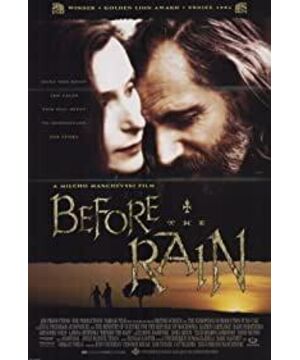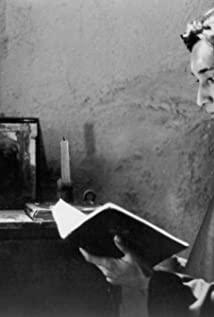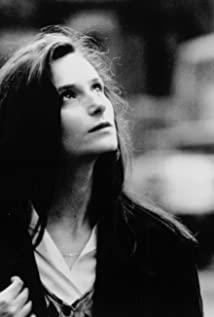Publisher: Macedonia / UK / France 1994
Director:米柯曼彻夫Chomsky
starring :瑞德塞柏嘉
Caitlin Carly Dai
major awards :: Venice film festival Golden Lion Award
FIPRESCI Prize
eleventh American film independent spirit Award for best Foreign language film
overview: a Discussion on religion, war, human nature and destiny The old movies of the film are cleverly structured, unique in perspective, beautiful in lens and memorable. Here (the villages inhabited by ethnic groups in the former southern region) the boundaries between justice and evil; light and darkness; beauty and ugliness are not as clear as Hollywood blockbusters. They are intertwined and entangled. "God" looked at the troubled land from heaven with compassionate eyes.
Synopsis: This film is divided into three parts, each separated by a subtitle. Each part is independent but interrelated. Implications and metaphors have become the most ingenious and thought-provoking "nodes" in the lens. Observing the details is the key to our appreciation of this film. (To be honest, I think it’s hard to really understand the whole essence of this film by just watching it once)
Part 1: WORDS (words) Scene of two villages in rural Macedonia.
A young Orthodox priest hides a cause of death under the gun of his fellow villager. A Muslim girl from a neighbouring village who fled after molesting her Orthodox villagers, her love grew. When the two overcame many difficulties (armed raids by hostile fellow villagers, and the understanding of the benevolent Orthodox elders), they were about to go to London to find the priest's uncle photographer, the girl's family found her. She wanted to kill the priest and take her home. In the end, the girl died under the gun of her brother in order to save her lover. The short-lived love withers in an instant, death is like a shadow, and only a sigh...
Part 2: FACES (face) scene in the city of London
Married woman Annie is a magazine editor. There is a husband who loves her very much, and a lover, Alex, who is very concerned about her. Alex is a war photographer from Macedonia. He fled his hometown to London 16 years ago and worked as a freelance photographer for a magazine. Many years of running around on the battlefield to shoot cruel scenes made Alex feel sick. This time he returned to London, hoping to take Annie back to her hometown and start a new life. But Annie refused him, still hesitating between the two men. Finally, when Anne's husband, who had been separated for many days, tried his best to save the pregnant Anne in the restaurant and tried to save their marriage, he was accidentally shot in the face by the rioters. Annie witnessed the tragedy with her own eyes, and she wanted to die...
Part 3: PICTURE (Photo) The Macedonian village
Alex returned to her hometown after 16 years, but the situation here is even more dilapidated than when he left. Ethnic and religious contradictions have caused continuous conflicts and bloodshed among people who are close neighbors. He went to visit his old Mu lover (perhaps this is the reason why he fled his hometown), but found that the emotions of the past have been separated by the cruel reality and become even more unfamiliar. On the third day after returning home, he was shot by a friend on the land of his hometown in order to save the executed Muslim girl from the neighboring village. The girl finally escaped. But the world is vast, where can she escape? The shot returns to the beginning of the first part. When Anne, who had lost her husband and was alone, came here to find her lover, she only saw Alex's coffin being buried. She hid her face and wept, but there were no tears...So
far we finally understand the cause and effect of the story. The Muslim girl that Alex gave to rescue is also the girl who died at the hands of her relatives at the beginning of the film to save her young lover. And this girl is the daughter of Alex's former lover. And Alex is the young priest's uncle in London. All these seemingly fatal tragedies shocked the heart of every movie viewer. Impossible love, dilemma, cruelty of brotherhood, when the kind of love and affection of human beings are ruthlessly strangled by ethnic and religious conflicts that seem to pursue lofty beliefs, everyone will ask themselves, the faith we have pursued throughout our lives What is it? Is this what God in our mind really wants us to do? With a compassionate humanitarian spirit, Mikko Manchevsky is accusing the world of vendettas from generation to generation like a circle. He is eager to resolve the tragedy of this world with the humanity itself that transcends ethnic and religious beliefs. But can he really achieve what he expected?
Classic shots: In the plot of this reincarnation, there are some shots with profound meaning and super shocking power. Note that the shocking power mentioned here is not the kind of shocking power that most people use to describe the stunts in Hollywood blockbusters! ! They will stay deep in your mind for a long time, often knocking on your heart.
The first part: the
scene :
A young Serb youth failed to search a Muslim girl in the church, and poured a full of bullets onto a kitten on the opposite roof basking in the sun. The black and white hair ball was torn apart by bullets in the harsh gunfire, and blood was splashed everywhere.
Shot 2 A
Muslim girl was shot and killed by her brother in order to save her Serb lover. When the young priest held her muddy-faced headache and cried, the girl just put her right index finger on her lips and told him not to stop. cry. The two widened eyes stagnated and lost their brilliance...
Part Two: The second part: The second part of the
shot :
Annie sorted out old photos in the editorial department of the magazine. One of the photos contained a Muslim girl who died under the gun of her brother. The moment. This handling beyond common sense is obviously deliberate by the director.
Two
shots sounded in the camera , and the crowd in the restaurant was in chaos. After the disaster, Annie was panicked looking for her husband, only to find that he was lying in a pool of blood, but she picked up her husband, but saw a bloody face...
Part Three:
Shot One
Alex was shot by his friend. He blocked the girl with his body and told her to run quickly. Then he lay on his back on the hillside of his hometown. The arid land finally ushered in a torrential rain, and Alex’s body was lying in the rain. .
Director: This film is the debut of Macedonian director Miko Manchevsky. In his early years, he studied film in the United States, where he became an excellent photographer and novelist. In 1991, Manchevsky returned to his hometown to visit relatives. Feeling the suffering caused by the continuous wars and fierce disputes in the motherland, he determined to make a movie of this kind. Three years later, "Heavy Rain Is Coming" came out. This mature, old and cutting-edge work is truly amazing. But the sad thing is that Manchevsky, who is now only in his thirties, has bid farewell to his career as a director. The epic blockbuster "Dust" became his masterpiece. He believes that Hollywood's commercial color and money capital have caused him to lose his original strong regional color and unique self-style. It seems that the "difference" between commercialization and artisticization is always an inevitable problem for artists.
Music: No one can ignore the vital role that music plays in this movie. They appear at the right time and are very touching. Based on this, PolyGram specially produced the soundtrack album for this movie. It is different from the singles of different bands taking turns in a hodgepodge of soundtrack albums. The Macedonian band Anastasia arranged all the works in the film and album. Gothic Byzantine music fused with Macedonian folk music and a strong humanistic sentimental composition constitute the overall tone of the music.
Time never die is a purely instrumental piece. The national plucked instruments are staggered to play a strong Balkan style, but the melody is filled with sorrow...this difficult land. Next is the nine iron doors (nine iron doors) that is 8 minutes and 24 seconds long, the trembling rhythm of Gaidi (Balkan bagpipes), and tapani (national percussion instruments) leading the deep male folk singing. How much I want to know what he is singing, but the language barrier blocked me. Coming back home (at the restaurant) are two songs that I have impressed me deeply. The touching and sad and graceful Balkan female vocals are only when the two protagonists and Annie's ex-husband are shot and killed in the movie. Just appeared. When the soul in my eyes floats from the body to the sky of nothingness, the image in the lens is deeply imprinted in my mind. So that as soon as you hear this song, it will reappear. The violin and piano in the instrumental music red and white are full of mental confusion and melancholy. In london cab (in london cab), it is also a purely instrumental piece, and the piano dingdong sounded in a dark box. Passing is again the familiar Byzantine chant, revealing the fatigue and expectation of returning to the homeland. The funeral theme is the interpretation of its original meaning. Then came the saddest death of alexander song in the album. The weeping female voice appeared again, unable to suppress the inner resonance. When the tolerant and upright, determined protagonist rescued the Mu girl And when he was shot and killed in the wilderness by his fellow tribe, it was this song that whirled in the sky, and every kind-hearted people would shed tears...Narrow-minded humanity...fateful tragedy...coming back 2 (coming back) home 2) It should express the meaning of a kind soul returning to the embrace of eternity through death, the flickering male voice is like the soul flying into the sky... from the nothingness and back to the nothingness, that is the eternal pain and sorrow A place of solace. That is the destination.... The last circle is not round (the circle is not round) should express a good wish that the hatred of history will no longer be repaid....and time will never go away (time never die) The same prelude echoes from end to end just like the ring itself.
To describe Anastasia, you can use many words: ethnic, Gothic, Middle Ages, Byzantium, melancholy, mystery, spirituality, quaint, magic... Of course, all of this is far less clear and profound than hearing their works.
Anastasia, composed of Zoran Spasovski, Zaltko Origjanski and Goran Trajkoski, became an army in 1987. It was originally called Aporea. In 1991, it was officially renamed Anastasia (meaning "recovery" in Greek) when the first mini album "Na Rjekah Vavilonskih" was released. Previously, the three belonged to three different bands, Padot na Vizantija (The Fall Of Byzantium), Lola V Stain and Mizar, but they were not satisfied with the group they were in. As the three met, they began to play Together, we explored and portrayed the notes surging in our hearts. The situation continued until the birth of the name Anastasia. After that, everyone aspires to take Anastasia as their lifelong career.
For those who like the Dead Can Dance ethnic fusion style or the Medieval music school in DarkWave, Anastasia is undoubtedly another treasure-like discovery: it also has a strong Gothic low-key mood, but attached to the spiritual essence of the musical spirit. But it is derived from the mysterious Byzantine religious music and ancient Macedonian folk songs-among most of the bands we have known before, few come from this area, or pay attention to the traditional music of Central Eastern Europe and the Balkans, which can reflect Representative of the musical style of the Orthodox or Byzantine Church. In fact, the Byzantine aesthetic concept, whether in art, architecture, or music, has a long and unique historical origin and cultural precipitation, and it is important for the historical development of Western Europe, the Slavic language family, and the cultural customs of Islamic regions. It has a far-reaching impact.
Byzantium is a Western world's name for the Eastern Roman Empire and its culture during the Renaissance. Soon after the founding of Christianity, it gradually split into the Latin-based Western School and the Greek Eastern School. The Eastern School was centered on Constantinople, and the Western School was centered on Rome, the capital of the Roman Empire. With the conquest of the Eastern Roman Empire by the Ottoman Turk Empire in 1453, the Eastern Church has since been in a slump. Since then, Western Christianity (Catholicism and Protestantism) has grown to become the most dominant faith in the world, while Eastern Christianity (Eastern Orthodox) has become increasingly weak by comparison. Coupled with the historical differences in the development of Eastern and Western civilizations, as well as the strangeness and separation of the two civilizations, the modern Western world often has a deep prejudice against Byzantine culture, thinking that it is just staying in the wild. The decadent things of the times ignore the value and significance of their existence, and people rarely have the opportunity to hear the thick and continuous Byzantine chant with a certain supernatural and enlightened nature.
As for the national music of Yugoslavia and Macedonia-Balkans, it was previously due to the isolation and suppression of the Cold War confrontation, and then the chaos and depression of division and turmoil, so that the outside world is rarely able to see their mysterious appearance. Therefore, when we are watching "Heavy Rain" and hearing music that is as magnificent and mysterious as the picture, with a strong oriental color, and with a strong religious spirit, showing the reincarnation and sense of belonging, we are so shocked. write.
Of course, although rooted in traditional ancient religions and ethnic music, Anastasia has absorbed music influence far beyond this. As they mentioned, it was the inspiration of some post-punk bands such as Joy Divisio and Killing Joke in the 1980s that prompted them to devote themselves to rock music; and some modern experimental, non-dance electronic music such as FSOL and Biosphere also responded to them. Inspiring a lot. The open-minded attitude towards music also shows that the band does not care how the unexpected world defines them: whether they are a nation or Gothic Byzantine music, or that their music is psychedelic or even electronic. , They think they are all justifiable, and they are happy that such inconsistent descriptions just show how rich and colorful their musical connotations are. While everyone in the band has the same pursuit, they also have different musical ideas. This is also regarded as a growing trend. In addition, even with strong regional colors, Anastasia has always denied that they are a traditional and representative Macedonian band, because they first created a kind of extremely personal music, pursuing the one that belongs to their inner world. This kind of voice, relatively, as a Macedonian, as a person who lives and grows in this land, makes their concerts imprinted with their own nation. Therefore, in many interviews they have repeatedly stated that they cannot represent the orthodox Macedonian national music, but at the same time they are proud of being a Macedonian band.
Since debuting, Anastasia has released a total of four albums. They are the mini album "Na Rjekah Vavilonskih" released under the small independent label DOM of Yugoslav Nish in 1991 (the Greek label Poeta Negra re-released this mini album in 1994 ); 1994 film soundtrack record "Before the Rain"; in 1997, an EP "Face / Burn" was released under Macedonian record company Third Ear Music, and the other album "Melourgia", a compilation of the unreleased works of Anastasia in the early years, In the same year, it was also released under the Greek label Libra Music; in 1998, the latest album "Nocturnal"
Although it belongs to the minority level of music, Anastasia has a wealth of performance experience, Skopje, London, Athens, Stockholm, Belgrade, Lisboa and other places have left their shadows. Regarding the split of the former Yugoslavia, Anastasia believes that it has not brought much emotional shock or harm, but because each region is now doing its own work, it is no longer as convenient for them to perform as before. However, it is precisely this that "forces" them to shift their music focus to central Europe, which indirectly makes their music successful in the former southern provinces. Because in the past, as a band from the province, it was difficult to sign with major record companies located in Belgrade and Sagbit, and rarely had the opportunity to appear on the stage of some important concert halls. In addition, they have also scored many movies, TV shows, stage plays, dances, etc. Among them, before the Rain directed by Milcho Manchevsky is naturally the most famous. In fact, it was through this excellent movie that they gained popularity around the world, and this is their best-selling album so far. Of course, this kind of "good" is only a mere over 100,000 sales.
Finally, it is worth noting that unlike the film soundtrack of "The Rain Is Coming", Anastasia's own music not only uses instrumental music such as kavali (a kind of flute), gaidi, tapani, etc. to highlight the profound national heritage, but also good at using computers. , Samplers, synthesizers and other modern technological means to create, so the electronic component occupies a large proportion in their music. On the whole, they created a unique music style that combines Byzantine religious music styles, Balkan national music percussion rhythms and modern rock music thinking.
An immortal film; a touching record; an excellent orchestra. This is all we want to tell you.
Written by: Murk&Eros
View more about Before the Rain reviews









